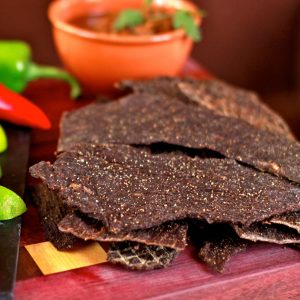Can I Request Jerky Made Without Certain Preservatives Or Additives?
Can I Request Jerky Made Without Certain Preservatives Or Additives?
Jerky is fully cooked meat that has been dehydrated, making it safe to eat even without refrigeration. The process also removes most of the moisture that would cause spoilage, extending its shelf life significantly.
Many varieties of meat can be made into jerky of the month club. Popular choices include beef, pork and turkey. It’s also possible to find venison, bison and salmon jerky.
What are the Preservatives and Additives in Jerky?
Jerky stormed into the snack market right as millennials began adopting high-protein, low-carb diets. The high-fat, salty snack is portable and mess-free and allows jerky eaters to be a part of their food tribes (paleo, keto, Whole 30).
Aside from its primary macronutrient makeup, beef jerky is also a treasure trove of vitamins and minerals. It’s rich in iron, zinc, and B-vitamins that aid blood health, wound healing, and energy production.
However, a recent study found that sodium nitrates and nitrites could be linked to colorectal cancer. It is important to read labels when purchasing jerky and avoid products that contain preservatives with questionable safety records. Luckily, making your own jerky at home is a simple way to control what chemicals and preservatives you’re putting in your body. Read on to learn more about the ingredients in jerky and how to make a healthy, natural version of this delicious snack.

How do I Keep My Jerky Fresh?
Jerky is a convenient snack that doesn’t require refrigeration, making it ideal for outdoor activities or trips. It’s also a great source of protein, which can help keep your hunger at bay while providing your body with essential nutrients.
When properly prepared, jerky can last for months or even years at room temperature without spoiling. However, it does lose flavor and texture over time.
The best way to keep your jerky fresh is by keeping it in an airtight container or plastic bag. Using a vacuum sealer or nitrogen flush can further extend the shelf life of your jerky. If you do decide to store jerky in the refrigerator, make sure it is sealed tightly to remove as much air as possible. Water droplets inside a jerky bag are an indication that the jerky has not been dehydrated long enough.
How Can I Make Jerky Without Preservatives or Additives?
Jerky is a tasty meaty snack that can be enjoyed on its own or added to soups and salads. It also provides many health benefits, including being high in protein and low in fat. However, when choosing jerky, it is important to look for varieties that are free of preservatives and additives. Making your own jerky is a simple process and can be more economical than buying pre-made varieties that contain added ingredients.
To make jerky without preservatives, select cuts of meat that are lean. Slice the meat into thin strips either with or against the grain, depending on your preference. Jerky sliced with the grain tends to be more chewy and leathery, while jerky sliced against the grain has a crispier texture.
Drain the meat and pat dry with paper towels before placing it on clean dehydrator racks or in a oven with the door cracked open. Spread out the slices so that they are not touching for best results.
What is Sodium Nitrite?
Sodium Nitrite is an inorganic compound with the chemical formula NaNO2. It is a white to slightly yellowish, crystalline salt. Sodium nitrite is often used as a curing agent to preserve meat products like jerky, bacon and other deli meats. This curing agent blocks the growth of Listeria and Botullism and offers a unique savory flavor to the preserved meats.
It also helps to keep cured meats from spoiling and provides them with a pink color. It also inhibits lipid oxidation in foods and has antioxidant properties, protecting against the formation of foul-smelling nitrosamines in cured meats.
This additive is used widely in the meat industry, but recent studies have shown that nitrates and nitrites may be carcinogenic in humans. The FDA limits the amount of nitrosamines that can be formed from sodium nitrates and nitrites in food to 100 parts per billion. In addition, many people are not aware that they can also get nitrates and nitrites naturally from vegetables like celery and spinach.